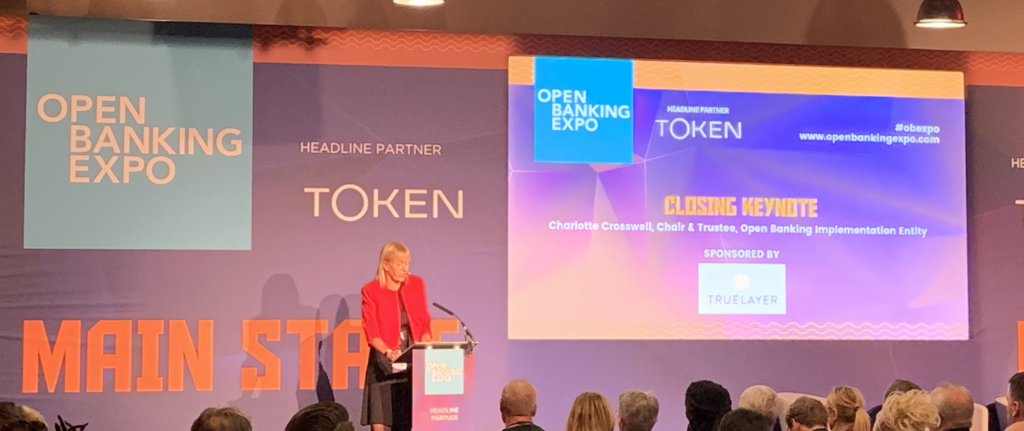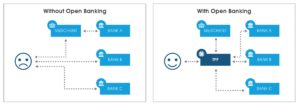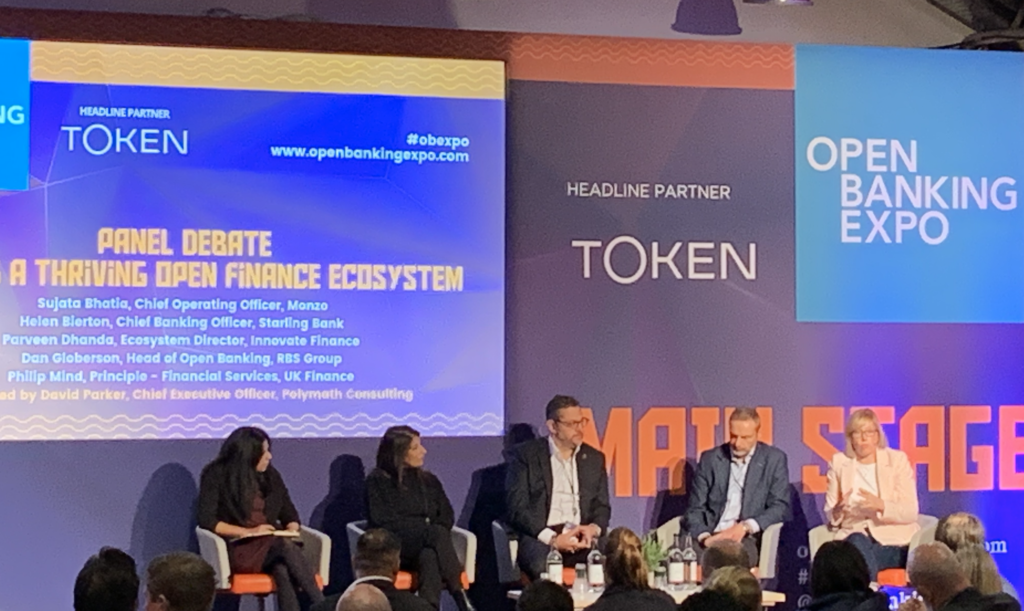 In a recent LinkedIn post, Julian Wells, Director and Financial Services & FinTech Lead at Whitecap, posed the question “Open Banking…. how are we doing?” In early November, the Open Banking Expo in London was attended by more than 500 people and firmly shone the spotlight on this topic. This blog summarises the UK’s progress with Open Banking and highlights some areas of focus for the future.
In a recent LinkedIn post, Julian Wells, Director and Financial Services & FinTech Lead at Whitecap, posed the question “Open Banking…. how are we doing?” In early November, the Open Banking Expo in London was attended by more than 500 people and firmly shone the spotlight on this topic. This blog summarises the UK’s progress with Open Banking and highlights some areas of focus for the future.
Open Banking launched in the UK with a fanfare in January 2018, and since then the UK has maintained a position as a global leader in the design and implementation of Open Banking regulation, technology, and propositions. Yet consumer adoption of Open Banking in 2022 has been forecast to be at approximately 30% of forecasts made back in 2018.
What is Open Banking?
For the benefit of those without a direct involvement in Open Banking, it is worth briefly defining the subject area.
Open Banking is a practice that enables banks and third-party financial service providers to obtain secure access to banking and other financial data, with the consent of the consumer. Once permission is granted, an individual or business’ financial data can be made available by one financial institution or a Third Party Provider (TPP) to another through an Application Programming Interface (API). This API technology provides a secure, quick way for parties to share data. By making it easier to access and share relevant data, the concept is that consumers and businesses can access better services and, as a result, the increased competition in the market will even the playing field for innovators of all sizes.
The principle that customers should control their data and be able to use it to ensure they get access to the best deals for them is a powerful one. It is also a principe that ultimately can span far beyond finance.

Open Banking in the UK
Open Banking standards were initially introduced in the UK by the Competition & Markets Authority (CMA) to increase the competition and innovation in the retail banking market. Increased current account switching was cited as a key objective, but over time the intent has been evolving with a broader focus on areas such as:
-
-
- Reduced overdraft fees
- Improved customer service
- Greater control of data
- Increased financial inclusion
-
Open Banking is now viewed as a precursor to expansion into other areas of financial services – Open Finance – and more broadly into other areas markets, such as utilities and energy – Open Data.
Open Banking technology in the UK has been designed by the Open Banking Implementation Entity (OBIE), which has created software standards and industry guidelines to drive competition, innovation, and transparency in UK retail banking. Since inception, OBIE has worked closely with the Government and regulators to create a world-leading ecosystem, with over 300 Third-Party Providers (TPPs) and 2.5 million users, helping maintain the UK’s position as one of the world’s most innovative and competitive financial markets.
APIs provide the means for safe exchanging of data, and the number of API calls has increased from 66.8 million in 2018 to almost 5.8 billion in 2021. Cumulatively, API call volumes reached over 7 billion between 2018 and 2020. In 2018, 320,000 Open Banking payments were made. This subsequently increased to over 4 million in 2020. The potential direct value Open Banking can have on customers, and indirect value in other areas of FinTech, is significant, with one projection of economic value from Open Banking-enabled services stated at £18 billion for consumers and small businesses.
Adoption of Open Banking
PwC released a report in 2018 forecasting that 71% of SMEs and 66% of adults would adopt Open Banking by 2022 and that the revenue opportunity created would increase to £7.2 billion by 2022. However, in reality, the adoption rates have been lower than expected, with approximately 4 million consumer and business users in 2021. Future forecasts vary with one estimate suggesting that number is expected to grow to 10 million users in 2022, whilst another estimate suggests 60% of UK consumers will be using Open Banking by 2030.
An upward trend is certainly evident, and a recent Equifax paper reported a 300% increase in Open Banking adoption over the last 18 months, stating it now has 180 live clients.
The Covid-19 pandemic has acted as a catalyst for Open Banking. According to statistics from Experian, the number of people choosing to share their data through Open Banking has tripled. In February 2021, there were 669 million data sharing requests made in the UK. Lenders are also seeing the benefits with recent Experian research finding that 57% of lenders have adopted Open Banking technology in the last 12 months.
With the utilisation of Open Banking on the rise, retail banks reliant on legacy systems and processes will experience the most significant challenges and there is the potential risk of losing the customer interface ‘battle’ as FinTechs, challenger banks, or other industry players develop and deploy better functionality or usability in the front end. Digital only banks have modern architectures that are largely free of legacy and are already modular and API based. Digital only banks are banks are set up for innovation, with operating models and processes in place for rapid innovation, and they have typically been built with an Open Banking model in mind. Therefore, they should be able to select which parts of the value chain they wish to focus on.
Challenges faced by Open Banking in the UK
Whilst the progress is very encouraging, there remain several challenges associated with the adoption of Open Banking. The most commonly referenced challenges relate to fears that greater value and quantity of shared financial and non-financial data could lead to increases in issues relating to data security, data misuse, financial crime, fraud, or scams. According to research conducted by EY in 2018, nearly half of the negative comments globally about Open Banking were centered around data protection and cybersecurity, and these remain topical themes today.
Also, there are concerns that low levels of financial literacy could increase the risk of poor consumer outcomes, and that a lack of awareness around Open Banking’s capabilities has made consumers less likely to consent to their data being shared, limiting banks and FinTech’s ability to innovate.
It is integral to create an ecosystem which educates people about Open Banking and where they can safely share their data with reliable APIs. Once the benefits are clearly demonstrable and understood, and there is trust in the security of the processes involved, we can expect to see the adoption of Open Banking accelerate further.
Here are some of the comments and responses from the recent LinkedIn post:
- “I’d say there’s strong momentum here and lots of opportunity still to be had.” – Andy Sacre, Director of Product, Open Banking and decisioning, Equifax
- “One other barrier to adoption is that there’s no cost advantage to paying by OB vs paying by card, despite merchants typically having to swallow 1.75% of card costs. Given the protection afforded by cards, the more complex UX of OB, it’s hard to see why consumers would choose OB given a choice.” – Richard Theo, FinTech Entrepreneur, Investor and NED.
- “Many consumers remain sceptical about Open Banking/Open Finance and I believe as an industry we have a way to go to overcome this” – Steve Carruthers, Head of Business Development, Iress
- “It has taken time to get customer experience near that of cards with big uncontrollable elements for the merchant or OB provider […] Couple that with the lack of refund capability and it really hasn’t been ready for mainstream eCommerce.” – Peter Conforth, Commercial Director, Answer Pay
In regulatory and technical terms, the progress made with Open Banking in the UK over recent years is impressive and has created opportunities for startups and innovators, as well as incumbents. Clearly there continue to be challenges to overcome if we are to achieve widespread adoption of Open Banking, and these relate to a broad range of topics including enhancing customer experience, the development of a stronger benefit case, and strengthening consumer trust.
The Development of Open Finance
Open Finance will extend the Open Banking principle to other financial products such as insurance, investment, and lending products. Under Open Finance, customers can agree to share their financial data using trusted APIs to access broader services such as financial advice and wealth management. Open Finance is an evolution of Open Banking and is expected to provide solutions to many problems in areas such as personal finance and financial wellbeing.
Open Finance is essentially designed to make it easier for FinTechs and smaller financial services players to access customer data (with consent) drawn from multiple providers, in order to develop and deliver new overarching products and services. It allows an increased amount of automation of financial management for consumers and businesses, and as with Open Banking it will be possible for innovative firms to create platforms to enable applications to make or support financial decisions based on consumer information and preferences.
As the regulatory requirements and data standards for Open Finance become clearer over the coming months, we can expect to see an increased amount of industry discussion and action in this field. The Open Banking Expo featured a closing keynote from Charlotte Crosswell, Chair & Trustee of Open Banking Implementation Entity, who shared her vision for OBIE and the future of Open Banking in the UK and beyond. Clearly the UK is not about to rest on its laurels and intends to not only enhance the effectiveness of the Open Banking regime, but also to drive the development of Open Finance.
For our part at Whitecap, we will continue to monitor the developments of both Open Banking and Open Finance and to help our clients understand the role these initiatives can play in helping them achieve their strategic and commercial objectives. We have seen high levels of interest in this field from organisations and sectors including retail banking, insurance, wealth management, private banks, challenger banks, FinTech firms, consumer finance providers, and other players interesting in leveraging opportunities resulting from Open Banking and Open Finance. Additionally, other countries continue to look to the UK for leadership, as they develop their own regimes.
One key point which was made several times at the Open Banking Expo is that Open Finance will be a much larger number of companies. How long will this take to rollout and embed? It is not going to be a quick process, and Open Finance will likely remain a prominent topic into the 2030s.
So, to return to the opening question of this blog, how are we doing with Open Banking in the UK? By all accounts we seem to be doing very well and making good progress. There are interesting times ahead as we start to focus on Open Finance. Like many organisations, we at Whitecap look forward to playing our part in the journey.

If you’d like to discuss this blog post or share your own perspective on the issues covered, please get in touch or comment via our social media channels on LinkedIn or Twitter .
Established in 2012, Whitecap Consulting is a regional strategy consultancy headquartered in Leeds, with offices in Manchester, Milton Keynes, Birmingham, Bristol and Newcastle. We typically work with boards, executives and investors of predominantly mid-sized organisations with a turnover of c£10m-£300m, helping clients analyse, develop and implement growth strategies. Also, we work with clients across a range of sectors including Financial Services, Technology, FinTech, Outsourcing, Consumer and Retail, Property, Healthcare, Higher Education, Manufacturing and Professional Services, including Corporate Finance and PE.